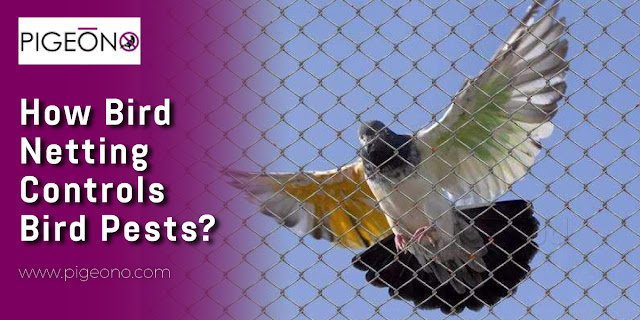How Bird netting controls Bird Pests?
Bird netting, often known as anti-bird netting, is a
technique of pest control used to keep birds away from a variety of crop types.
It is essentially a type of protection netting that keeps birds from pecking at
or eating various fruits and vegetables, etc.
Bird netting is a simple but effective method of pest
management. It successfully prevents birds and other pests from causing crop
damage. It is the most effective kind of pest management available for birds,
bats, and other flying beings.
Pigeono offers the top quality and humane bird prevention strips to
provide protection against birds and bird pests.
How does Bird Netting function?
Bird netting can be used for a variety of purposes,
including pest management and crop protection. They are mostly employed by
farmers and aqua culturists to minimize excessive losses to their businesses.
Bird nettings are sold in rolled-up packets. They can also meet the needs of
backyard gardeners and independent producers.
Control Bird Pests via Bird Netting:
The primary goal of any netting is to successfully
control any bird damage. Vegetables and fruits such as strawberries,
blueberries, grapevines, peaches, plums, nectarines, and figs are protected by
bird netting. It also protects crops and seedlings from being ripped apart or
destroyed by birds. However, birds are not the sole source of the pestilence
that the netting prevents. Bats have also been known to and can cause
significant damage to fruits such as apples, mangoes, and pears.
Certain birds, such as grackles and ravens, can be
harmful to plant life. They not only inundate trees and other plants, but they
also excrete a lot of waste. That is not good for plant life, crops, or the
environment. The uric acid in the faeces is not only unpleasant, but it also
corrodes metals, paints, and other things. Repairs cost farmers and
agricultural growers hundreds, if not thousands, of dollars. In comparison,
getting bird netting to avoid damage is a far better option.
Get the top quality bird control products from the
leading bird spikes manufacturers in
Vadodara, Gujarat, Pigeono.
However, most crucially, anti-bird netting prevents
birds and other pests from nesting in those trees. Apple trees, orange trees,
lemon trees, pomegranate trees, avocado trees, banana trees, and so on are
examples. Essentially, the nets serve as bird roost deterrents. Then, of
course, there's the sickness. Birds are known to carry approximately sixty
diseases. Pigeons, for example, are carriers of diseases such as tuberculosis,
influenza, Toxoplasmosis paratyphoid, Lyme disease, and encephalitis. That
doesn't even take into account the hundreds of diseases that bats have been
linked to. These infections or diseases might infect your clients and cause
your company to be banned by suppliers or blacklisted in the suppliers market.
The better option is to install bird netting to prevent this from happening in
the first place.
●
Crop Protection:
Even if only a small amount of fruit,
vegetable, or crop is bitten off, harvesting and selling it becomes impossible.
As a result, the harvest or crop may no longer be a financially viable
commodity. If it is collected, there is a high likelihood that the fruit will
contain bacteria from the bite. It may also transmit rot or ferment, both of
which harm the harvested case.
This is why bird safety netting is
commonly used on stand-alone trees such as pears, grapes, apples, and peaches.
They can even be mounted on the ventilation windows on the sides of growth
tunnels. That is great for fruits such as strawberries, cranberries,
raspberries, and blueberries.
Pigeono is a popular bird control netting supplier in India.
●
Fishery Protection:
When you think of bird nets, you
generally don't think of the other applications or uses that they may be put
to, but they can also be used to protect fisheries, ponds, and pools. Yes, bird
netting is an excellent strategy to prevent predatory birds from taking off
small fish and destroying the ecosystems of fisheries, Koi ponds, or any other
aquatic life you wish to conserve.
Aqua culturists employ nets to
protect tilapia and shrimp farms, to name a few. They guard the farms against
marauding birds as well as native birds. Because of the power of our commercial
bird netting, they include pelicans, herons, seagulls (of course), and
cormorants.
●
Building Protection:
Buildings that are vulnerable to
birds flying in and becoming a nuisance may also require bird proofing. Bird
proofing in these troubled locations is becoming more mandatory for urban bird
species that are believed to be more adaptive to city life.
If you are looking for the best-in-class bird prevention products in Vadodara,
Pigeono is the right choice for you.
The advantage of this is that it
produces a more or less impenetrable barrier that protects premises without
really injuring birds. In these cases, netting can be an extremely effective
deterrent for big, open surfaces such as roofs and even loading bays. Of
course, design considerations must be made, such as the type of material used
and the fastening employed. It must essentially be optimised for the bird
species that must be kept out.
●
Mining Ponds:
Chemical agents are commonly used by
miners to aid in the extraction of minerals or metals from crushed rocks.
Chemicals are always dangerous to the human body. They must be maintained
separately from volatile species and sensitive creatures, such as migrating
birds. Bird netting is used to protect birds in this scenario.



Comments
Post a Comment